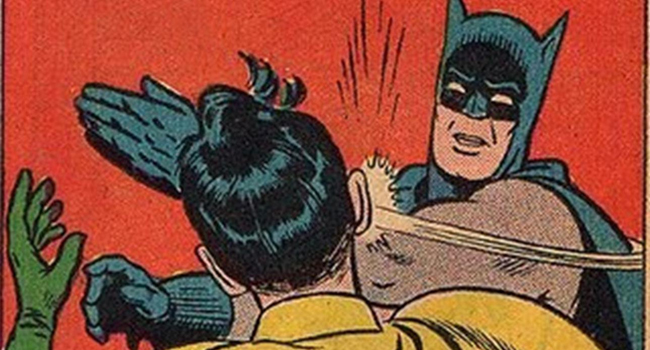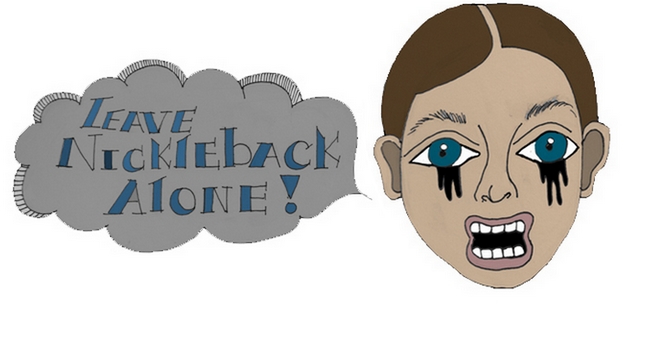What does it mean to be a fan of a “bad” band? As children of an age in which almost everything is religiously scrutinized, we are conditioned to be constantly in search of things that are objectively good. Dirty Projectors. James Blake. DOM. Hell, the least-reported part of Chuck Klosterman’s career is that he was a glorified KISS fanboy for the beginning of it. We are shamed by our likes that don’t conform.
Blink-182, ridiculous as it might seem, descend from KISS. There were, and still are, myriad bands (as well as couriers of other art forms) we are trained to be ashamed of liking, even if such a notion is ridiculous. But Blink-182 always seemed to be the most likely candidate to assume the mantle of the easy-to-dismiss joke band. They aren’t even ironically great, like KISS. Like Maroon 5, or Sum 41, or Third Eye Blind, Blink-182 are just another stupid radio flash-in-the-pan; a bad band with no more substance than “All the Small Things” would indicate. There’s no reason to believe in Blink-182. There’s no reason to trust that three dumb kids from San Diego, one of whom got kicked out of high school for alcohol abuse, would be able to subvert their nature as three-chord, down-strumming radio derivatives to become more than anybody ever thought they could be. Enjoy your Now That’s What I Call Music entry, Blink-182; that is your critical high-water mark.
This derision, the off-hand, easy snap judgment made by pretty much any mildly musically inclined human being more than 26 years old, is exactly why being a Blink-182 fan is something of a communion with oneself. Our fanhood is an affirmation.
In the music community, we are judged on uniqueness. Conforming to some version of the objective norm will get you a long way and has its distinct advantages, but what you the individual are qualified by are the things you like that you don’t find because the Internet already has affirmed its greatness. This is not a justification for liking “bad” bands, mind you. It is merely the acknowledgment that perfection, if there is such a thing in such a subjective medium, is boring. Music is a communion of dissenting souls. It’s what is so beautiful about Spotify: By marking every song we listen to and sharing it, we can no longer hide our affinity for certain things in order to seem more in line with normative greatness. But no longer can a nervous pop-punker hide in the shadows, feigning advancement while popping in Enema of the State for a spin once more.
All this to say that, were Blink-182 to appear semi-prominently in a friend’s Spotify listening history, that fact seemingly would say a lot about the listener. On the surface, being a Blink-182 fan is about brainless acceptance; “The Party Song” comes with few requisite tools for listening, and one of them isn’t a cogent mind. On the surface, Blink-182 fans are men, between ages 18 and 26, who grew up in an era dominated by six bands: Blink, Green Day, Fall Out Boy, Jimmy Eat World, Brand New and Taking Back Sunday. They are the type of men who either pledged their frat and misread the meaning of songs such as, “Anthem, Part Two,” or were logging on to their Xanga or Diaryland account profiles and misinterpreting the subtext of songs such as, “Story of a Lonely Guy” and “Dysentery Gary.” Being a Blink-182 fan, to the outsider, is about missing the point. It’s about getting succored into the distillation of various thoughts and feelings (emo, punk, rom-com-pop and teenage idiocy), packaged in a radio-sized whole. Being a Blink-182 fan is easy because it requires nothing of you.
For a while, that was true. People who subscribe to these beliefs have either not heard of or blatantly ignored the 1997 classic Dude Ranch (in similar fashion to the way Green Day’s Dookie was ignored until the release of American Idiot). What’s more important though, is that in that fruitful four-year period when Blink-182 was at its most radio-pop-punk friendly—those two first Travis Barker albums—gave dissenters enough case to disregard anything that came after that.
Which is a shame, because Untitled could have been such a difference maker.
Nobody talks about Untitled, also known as Self-titled, because the people who drive the musical conversation long had tuned out Blink-182 by 2003. American Pie was dwindling in influence, and so was the dumb pop-punk wave, slowly ceding itself to the firestorm that would be the Midwestern and Long Island emo scenes of the mid-Aughts. There still were fans and fan sites burning up the Internet for the latest Blink-182 news, but for the most part, everybody was moving on right around the time Blink-182 was turning in what can only be described as pop-punk’s OK Computer. A brash vision of the things that an oft-maligned genre could be, Untitled was proof positive that while Blink-182 still were the dumb, three-chord down-strummers they had always been, their struggle to achieve something more was yielding results. To people who still were listening, Untitled was a tour de force. Blink-182’s loyal audience was getting older, and to meet with the advancing desires of their audience, knowing full well that another infusion of youth fanhood probably wasn’t on the horizon, Blink-182 chose to grow with its fans. They challenged every Blink-182 fan to grow up and forget the past, or perish and go listen to “Adam’s Song” feeling nostalgic. Untitled was uncompromising, which is after all, one of the traits “great” bands have in spades.
Thinking about the past eight years as a Blink-182 fan is sort of like willingly submitting yourself to the slow death of diminishing returns. Eight years is an incredibly long time, especially for a fan base that could, without much difficulty, find capable jumping-off points for their non-Blink-182-based musical growth (the five bands listed above are a pretty good place to start). But the key to being a Blink-182 fan for all these years has been the torturous relationship we have with the band’s members.
Being a Blink-182 fan is sort of a communion, and the sentiment is not necessarily devoid of religious context. While many other post-break-up band comparisons bring to mind the seminal Lennon-McCartney feud, Blink-182’s split is more acrimonious given that no one, even Blink fans, would put either title of Lennon or McCartney on any of the band members. There was no creative head of Blink-182. There was a well-oiled machine with defined parts, but never an inclination that one part was dictating the pace more than the others. So when Angels and Airwaves, the spawn of Tom DeLonge, and +44, the baby of Mark Hoppus and Barker, appeared, the closest relation to the ways the two bands fit together might well be viewed as the divorce of Christianity into rival disparate, but not entirely separate, factions.
DeLonge went for the grand vision, naming himself the Great White Hope of the pop-punk set, grabbing a handful of simple U2 effects pedals and a misguided belief that his fans were ready to start a musical revolution with him at the center. DeLonge’s egoism has taken the brunt of the blame for breaking up Blink-182 in the prime of its creative career, and such an accusation is probably a bit more than a little warranted. We Don’t Need to Whisper, AVA’s (as they’re wont to be acronym’d) first and easily most acceptable effort, never hit anywhere close to half of the audience that the great Blink-182 singles of the day hit, making the blatant goal of a rabble-rousing, more-pop-than-punk band on its face a failure. Those who sided with DeLonge in the not-exactly-brutal Blink break-up mostly were sticking around because DeLonge was the first to get his foot in the door and seize upon a still-heartbroken fan base. If Hoppus or Barker had been quicker on the trigger and released a record before Whisper, who knows whether DeLonge would’ve even had the audience to headline the half-stadiums that he believed he was starting his revolution in. Angels and Airwaves was a passing trifle, a fact that spurned fans were eager to point out once AVA began to descend into its crater of the worst side-project band of all time.
+44 was much different for various reasons that aren’t necessarily earned. Hoppus and Barker came away from the Blink break-up squeaky clean, getting a veritable free pass from fans who had learned why DeLonge had broken up the band (refusing to tour, only wanting to record in his home). Being a Hoppus fan post-Blink-182 was a little like cheering somewhat boring consistency—diminishing results with sparks of greatness. But for those who insist that Hoppus and Barker’s project was a sublime effort of, “Let’s just go out there and make music, fuck the message,” compared with DeLonge’s, “Message first, music later,” there is a missing link that made +44 a more sinister entity than people have ever really thought: public relations. Hoppus came out and announced +44 with the somewhat strange promise that the band would be a three-person project between him, Barker and Get The Girl vocalist Carol Heller. It would be a much more electronic project, something that Blink had shied away from. It would be an adventure in the musical sense, obviously preferable to DeLonge’s adventure in the egotistical sense.
But +44 didn’t end up anything like that. Heller dropped out, only making a passing guest appearance on the album’s lone love song “Make You Smile,” and the band proceeded to become a generic pop-punk band with the slightly strange hook of being the modern child of a Rancid/The Cars baby. When Your Heart Stops Beating was a strange, hard-to-classify album for many Blink-182 fans, simply because it was clearly covering territory Blink had tread years ago, only in a less-memorable way. Hoppus still was the sympathetic underdog of the Blink-182 break-up, but the music he was making didn’t seem at all adventurous enough to warrant putting the critical money on his horse. As misguided as it was, and as many miserable songs that are on the record, AVA’s Whisper outpaces When Your Heart Stops Beating in a few areas.
But the lingering taste of eight years without Blink-182, with only two passable records and two profoundly abhorrent ones to tide fans over, was something that Blink-182 fans were going to have to reconcile with themselves. Again, we are brought back to the idea of Blink-182 fanhood as a communion or affirmation of faith.
In 2003, Blink-182 made a record that will never be called one of the best records of the 2000s, but it was. It was a record that defined a certain period of time for a certain sector of people, a cross-section of the listening public that would go on to view Untitled as something of a talisman to their own individuality. The lesson Untitled purportedly taught Blink-182 fans was that our personal experiences with that record were just that: personal. We were forgetting the personal desires and experiences of the members of the band. So when the members of Blink-182 made four below-average records (five if you count the abysmal Neighborhoods), we viewed such subjective “failures” the only way we could—from an audience perspective. But as anybody who’s ever been in a band knows, a fan’s perspective is only half of the issue. The members of the band themselves have their own unique experiences, and what fans oft forget is that Mark, Tom and Travis’ reactions to Untitled were much the same as our own. Untitled was an affirmation of their individuality, a statement that each of the three band members of Blink-182 had something to say outside of the band, some journey to go on alone now that this opus had been released and shared among the people.
Untitled was a moment that the reunion of Blink-182 somewhat cheapens. Because it was a fork in the road, a marker to every fan and member of Blink-182 to start on their own path toward self-discovery, Untitled should have been the end of one journey: the journey of Blink-182 and its fans. Everyone, including the band, has grown up, far past the point we were at eight years ago. Blink-182 being together again feels like a class reunion, a meeting of disparate people who once were drawn together by an impressively strong bond, now unsure of whether the past eight years have changed their perspective on their peers or their former mentors. Listening to the best Blink-182 records (Untitled and Dude Ranch) bears more resemblance to a time capsule than a diary entry now, which is not a bad thing. We all need time capsules to remind us of who we were at that juncture in life. The Blink-182 discography probably feels this way to the band themselves, in a somewhat different way.
“Great” bands bond people together. Some circles are larger than others (The Beatles’ bond, for instance, is pretty much all of Western musical humanity). Every “great” band has the ability to nurture a singular feeling among disparate and otherwise unremarkably different people. Sometimes this bond is clearly illustrated at shows, when such a communion is openly shared. But sometimes that affirmation of friendship is found after its own end, when the people who once were bound together under the name of a “great” band find themselves back where they were, forced to reckon with the people they have become. Neighborhoods—and the entire Blink-182 reunion—is that time. Fans of Blink-182 find themselves together again, staring at what has become of the band that changed many of their lives Nov. 14, 2003. The band now stares out at their fans, eight years older than they were when last they handed out CDs as evidence of their own personal bond. We’re all different people, and many of us will have differing opinions and feelings about what Neighborhoods means to us, what Blink-182 being back together means to us, and whether all of this was worth it. But we should realize we might be that we’re all together now. More than any crowd-marshaling breakdown DeLonge could come up with. More than another 3:30-long anthem from Hoppus. More than a Barker drum solo. More than any of that, the mere name Blink-182 has brought, for better or worse, the communion of fans together again.
For that, indeed, is what a great band does.



